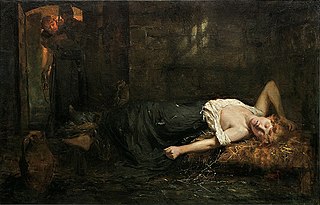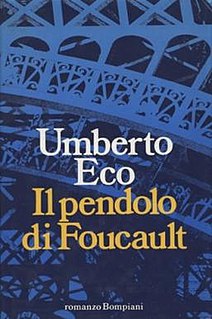
Nihilism is a philosophy, or family of views within philosophy, that rejects generally accepted or fundamental aspects of human existence, such as objective truth, knowledge, morality, values, or meaning. The term was popularized by Ivan Turgenev, who made use of it in his novel Fathers and Sons.
Postmodernism is an intellectual stance or mode of discourse defined by an attitude of skepticism toward what it characterizes as the "grand narratives" of modernism, opposition to notions of epistemic certainty or the stability of meaning, and emphasis on the role of ideology in maintaining systems of socio-political power. Claims to objective fact are dismissed as naive realism, with attention drawn to the conditional nature of knowledge claims within particular historical, political, and cultural discourses. Thus, the postmodern outlook is characterized by self-referentiality, epistemological relativism, moral relativism, pluralism, irony, irreverence, and eclecticism; it rejects the "universal validity" of binary oppositions, stable identity, hierarchy, and categorization.
Postmodern philosophy is a philosophical movement that arose in the second half of the 20th century as a critical response to assumptions allegedly present in modernist philosophical ideas regarding culture, identity, history, or language that were developed during the 18th-century Enlightenment. Postmodernist thinkers developed concepts like difference, repetition, trace, and hyperreality to subvert "grand narratives", univocity of being, and epistemic certainty. Postmodern philosophy questions the importance of power relationships, personalization, and discourse in the "construction" of truth and world views. Many postmodernists appear to deny that an objective reality exists, and appear to deny that there are objective moral values.
Post-structuralism is a term for philosophical and literary forms of theory that both build upon and reject ideas established by structuralism, the intellectual project that preceded it. Though post-structuralists all present different critiques of structuralism, common themes among them include the rejection of the self-sufficiency of structuralism, as well as an interrogation of the binary oppositions that constitute its structures. Accordingly, post-structuralism discards the idea of interpreting media within pre-established, socially constructed structures.

Posthumanism or post-humanism is a term with at least seven definitions according to philosopher Francesca Ferrando:
- Antihumanism: any theory that is critical of traditional humanism and traditional ideas about humanity and the human condition.
- Cultural posthumanism: a branch of cultural theory critical of the foundational assumptions of humanism and its legacy that examines and questions the historical notions of "human" and "human nature", often challenging typical notions of human subjectivity and embodiment and strives to move beyond archaic concepts of "human nature" to develop ones which constantly adapt to contemporary technoscientific knowledge.
- Philosophical posthumanism: a philosophical direction that draws on cultural posthumanism, the philosophical strand examines the ethical implications of expanding the circle of moral concern and extending subjectivities beyond the human species.
- Posthuman condition: the deconstruction of the human condition by critical theorists.
- Posthuman transhumanism: a transhuman ideology and movement which seeks to develop and make available technologies that eliminate aging, enable immortality and greatly enhance human intellectual, physical, and psychological capacities, in order to achieve a "posthuman future".
- AI takeover: A variant of transhumanism in which humans will not be enhanced, but rather eventually replaced by artificial intelligences. Some philosophers, including Nick Land, promote the view that humans should embrace and accept their eventual demise. This is related to the view of "cosmism", which supports the building of strong artificial intelligence even if it may entail the end of humanity, as in their view it "would be a cosmic tragedy if humanity freezes evolution at the puny human level".
- Voluntary Human Extinction, which seeks a "posthuman future" that in this case is a future without humans.

Discourse is a generalization of the notion of a conversation to any form of communication. Discourse is a major topic in social theory, with work spanning fields such as sociology, anthropology, continental philosophy, and discourse analysis. Following pioneering work by Michel Foucault, these fields view discourse as a system of thought, knowledge, or communication that constructs our experience of the world. Since control of discourse amounts to control of how the world is perceived, social theory often studies discourse as a window into power. Within theoretical linguistics, discourse is understood more narrowly as linguistic information exchange and was one of the major motivations for the framework of dynamic semantics, in which expressions' denotations are equated with their ability to update a discourse context.

In sociology, anomie is a social condition defined by an uprooting or breakdown of any moral values, standards or guidance for individuals to follow. Anomie is believed to possibly evolve from conflict of belief systems and causes breakdown of social bonds between an individual and the community. An example is alienation in a person that can progress into a dysfunctional inability to integrate within normative situations of their social world such as finding a job, achieving success in relationships, etc.

Foucault's Pendulum is a novel by Italian writer and philosopher Umberto Eco. It was first published in 1988, and an English translation by William Weaver appeared a year later.

Jean Baudrillard was a French sociologist, philosopher and cultural theorist. He is best known for his analyses of media, contemporary culture, and technological communication, as well as his formulation of concepts such as simulation and hyperreality. Baudrillard wrote about diverse subjects, including consumerism, gender relations, critique of economy, economics, social history, art, Western foreign policy, and popular culture. Among his best known works are Seduction (1978), Simulacra and Simulation (1981), America (1986), and The Gulf War Did Not Take Place (1991). His work is frequently associated with postmodernism and specifically post-structuralism. Nevertheless, Baudrillard can be also seen as a critic of post-structuralism and had distanced himself from postmodernism.
Subjectivity in a philosophical context has to do with a lack of objective reality. Subjectivity has been given various and ambiguous definitions by differing sources as it is not often the focal point of philosophical discourse. However, it is related to ideas of consciousness, agency, personhood, philosophy of mind, reality, and truth. Three common definitions include that subjectivity is the quality or condition of:
The philosophy of social science is the study of the logic, methods, and foundations of social sciences. Philosophers of social science are concerned with the differences and similarities between the social and the natural sciences, causal relationships between social phenomena, the possible existence of social laws, and the ontological significance of structure and agency.

In social theory and philosophy, antihumanism or anti-humanism is a theory that is critical of traditional humanism, traditional ideas about humanity and the human condition. Central to antihumanism is the view that philosophical anthropology and its concepts of "human nature", "man" or "humanity" should be rejected as historically relative, ideological or metaphysical.
Social alienation is a person's feeling of disconnection from a group – whether friends, family, or wider society – to which the individual has an affinity. Such alienation has been described as "a condition in social relationships reflected by (1) a low degree of integration or common values and (2) a high degree of distance or isolation (3a) between individuals, or (3b) between an individual and a group of people in a community or work environment [enumeration added]". It is a sociological concept developed by several classical and contemporary theorists. The concept has many discipline-specific uses, and can refer both to a personal psychological state (subjectively) and to a type of social relationship (objectively).
Emptiness as a human condition is a sense of generalized boredom, social alienation and apathy. Feelings of emptiness often accompany dysthymia, depression, loneliness, anhedonia, despair, or other mental/emotional disorders, including schizoid personality disorder, post-traumatic stress disorder, attention deficit hyperactivity disorder, schizotypal personality disorder and borderline personality disorder. A sense of emptiness is also part of a natural process of grief, as resulting death of a loved one, or other significant changes. The particular meanings of "emptiness" vary with the particular context and the religious or cultural tradition in which it is used.

The Archaeology of Knowledge by Michel Foucault is a treatise about the methodology and historiography of the systems of thought (epistemes) and of knowledge which follow rules that operate beneath the consciousness of the subject individuals, and which define a conceptual system of possibility that determines the boundaries of language and thought used in a given time and domain. The archaeology of knowledge is the analytical method that Foucault used in Madness and Civilization: A History of Insanity in the Age of Reason (1961), The Birth of the Clinic: An Archaeology of Medical Perception (1963), and The Order of Things: An Archaeology of the Human Sciences (1966).
Indeterminacy, in philosophy, can refer both to common scientific and mathematical concepts of uncertainty and their implications and to another kind of indeterminacy deriving from the nature of definition or meaning. It is related to deconstructionism and to Nietzsche's criticism of the Kantian noumenon.

Heterotopia is a concept elaborated by philosopher Michel Foucault to describe certain cultural, institutional and discursive spaces that are somehow 'other': disturbing, intense, incompatible, contradictory or transforming. Heterotopias are worlds within worlds, mirroring and yet upsetting what is outside. Foucault provides examples: ships, cemeteries, bars, brothels, prisons, gardens of antiquity, fairs, Muslim baths and many more. Foucault outlines the notion of heterotopia on three occasions between 1966–1967. A lecture given by Foucault to a group of architects in 1967 is the most well-known explanation of the term. His first mention of the concept is in his preface to The Order of Things, and refers to texts rather than socio-cultural spaces.
Criticism of postmodernism is intellectually diverse, reflecting various critical attitudes toward postmodernity, postmodern philosophy, postmodern art, and postmodern architecture. Postmodernism is generally defined by an attitude of skepticism, irony, or rejection toward what it describes as the grand narratives and ideologies associated with modernism, especially those associated with Enlightenment rationality though postmodernism in the arts may have their own definitions. Thus, while common targets of postmodern criticism include universalist ideas of objective reality, morality, truth, human nature, reason, science, language, and social progress, critics of postmodernism often defend such concepts. It is frequently alleged that postmodern scholars promote obscurantism, are hostile to objective truth, and encourage relativism to an extent that is epistemically and ethically crippling. Criticism of more artistic post-modern movement such as post-modern art or literature may include objections to a departure from beauty, lack of coherence or comprehensibility, deviating from clear structure and the consistent use of dark and negative themes.
This is a list of articles in continental philosophy.
Carl A. Raschke (1944-) is an American philosopher and theologian. Raschke is a Past Chair and Professor of Religious Studies Department at the University of Denver, specializing in continental philosophy, the philosophy of religion and the theory of religion. He was given the university lecturer award for 2020-2021. He is also listed with the affiliated faculty of the Global Center for Advanced Studies.







